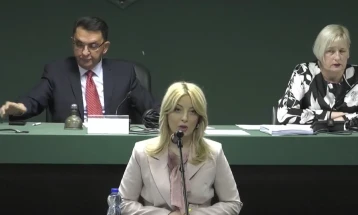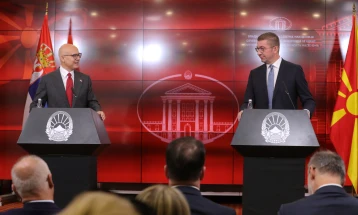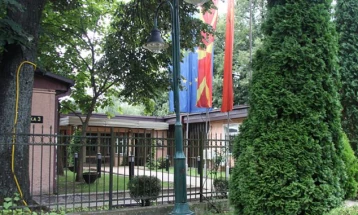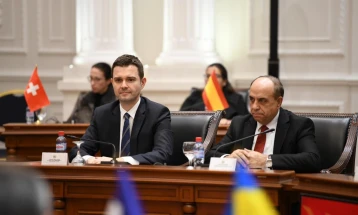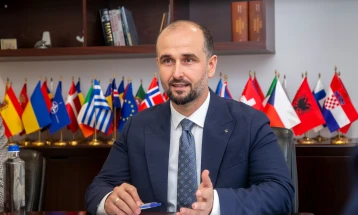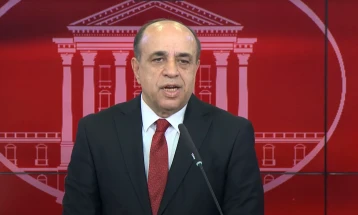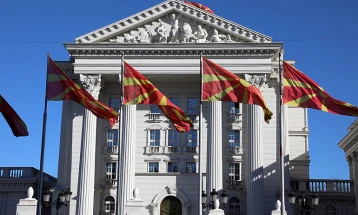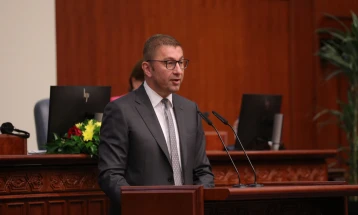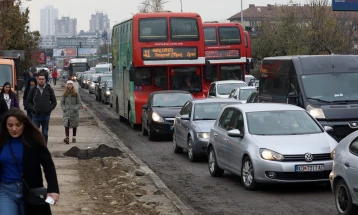Welcoming refugees not only moral imperative but international obligation, UNHCR's Godoy tells MIA
- World Refugee Day, an international day organised every year on 20 June by the United Nations, is marked in 2024 with a record number of forced displacements worldwide. The Global Trends report shows an increase of this figure for the 12th year running, says Gabriel Gualano de Godoy, Representative for the Office of the United Nations High Commissioner for Refugees (UNHCR) in North Macedonia, in an interview with MIA.
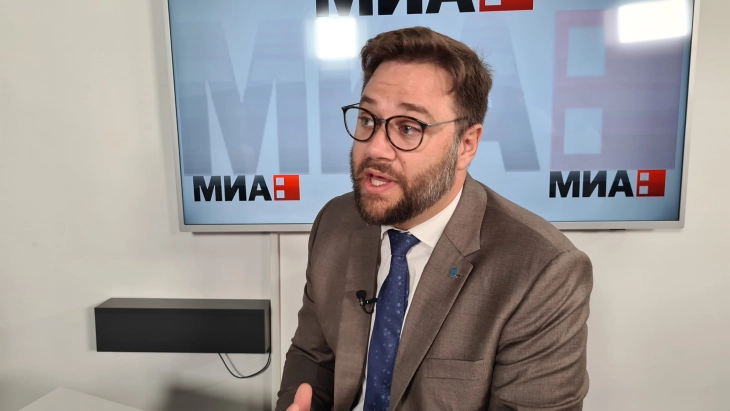
Skopje, 20 June 2024 (MIA) - World Refugee Day, an international day organised every year on 20 June by the United Nations, is marked in 2024 with a record number of forced displacements worldwide. The Global Trends report shows an increase of this figure for the 12th year running, says Gabriel Gualano de Godoy, Representative for the Office of the United Nations High Commissioner for Refugees (UNHCR) in North Macedonia, in an interview with MIA.
Godoy says this is a sad record and calls for a stronger alliance for inclusion in protection of refugees around the world.
"By December 2023, states say that more than 117 million were forcibly displaced. This means that 1.5 percent of the humanity is uprooted as a consequence of gross violations of human rights. This is a world record, a sad record. We are marking the World Refugee Day to make a call for a stronger alliance for inclusion in protection of refugees around the world," says Godoy.

According to him, the main reasons for this are old and new conflicts, difficulty to address the root causes of war and the lack of responsibility sharing, which are the main aspects that are causing difficulties to not produce more refugees.
"The situation in the main countries such as Afghanistan, Syria, Ukraine, but also Somalia, DR Congo, more recently Sudan, Palestine, those are the countries that the Global Trends report is highlighting. There are, for example, more than 10 million persons in Sudan who have been uprooted. If we think about the conflict in Gaza in the state of Palestine, 80 percent of Palestinians are internally displaces as a consequence of the gross violations happening there," says Godoy.
As per the report, majority of persons are forced to flee in neighboring countries, with 69 percent of refugees finding safe haven in the country next to their country of origin.
"This means that we can find refugees close to the countries that I have just mentioned that are producing large part of the population being forcibly displaced. There is also an increasing need to find solutions elsewhere. Every country could become a country of asylum and that is why it is important to think about the lessons learned from this process and what can be done to find more and better solutions for refugees. They are persons who have to be welcomed. This is not only a moral imperative but also an international obligation," notes Godoy.
106 asylum applications waiting for decision in North Macedonia
The 1951 Convention was designed to protect refugees and asylum seekers, and UNHCR is supporting refugees worldwide and supporting host-countries, host-communities to make sure that persons fleeing war can find the opportunity to rebuild their lives in safety and security. North Macedonia adhered to the convention 30 years ago, in 1994.
On the situation in North Macedonia, the UNHCR representative says the country has seen uprooted population in the past and many Macedonian families had seen the consequences of war and conflict.
"Nowadays we have a different situation. Last year, 602 asylum applications were submitted, this year 106 asylum applications are waiting to be decided by the Ministry of Interior and the Sector for Asylum. Our agency is supporting the Government, the Sector for Asylum, also working closely with bar associations and civil society organizations to make sure that asylum seekers and refugees have access to legal aid, supporting translation and interpretation, and also during their integration process," says Godoy.
He adds it is also important to pay attention to the other forms of protection available: subsidiary protection, temporary protection for Ukrainian refugees who are very important because there are Ukrainian refugees receiving temporary protection in your country.
"Those are aspects that are very relevant, to make sure they have a legal status, the ability to enjoy access to rights, protection, and to become part of the society, to rebuild their lives, their safety and security until the war is over," says Godoy.

UNHCR can support the country in two main areas - strengthening the right to asylum but also rights in asylum.
"It is possible to strengthen the asylum system and have a better recognition rate for cases that deserve international protection. You should also support refugees to have access to rights, not only the right to asylum but the socio-economic rights that must come with international protection. This means being available to older children in school, be able to get support from the healthcare system, to have access to a legal document, to open a bank account and be part of the labor market so you can pay taxes and contribute to the local economy," says Godoy.
Asked if this process going smoothly in the country, he refers to the cooperation with the Government, academia and NGOs but also highlights the need to bring in more allies from the private sector.
He adds that the country has pledged to support and strengthen the asylum system by 2027, which is a very important measure to make sure that the asylum system will be fairer and more efficient.
"The country has also started to work towards an infrastructure for better local integration for refugees, how to harmonize legislation, so access to education, healthcare, socio-economic rights, including the right to work is available for asylum seekers and refugees. The access to those rights can be effective and enjoyed timely. Currently, asylum seekers are taking many months to be able to enjoy the right to work. Certainly those pledges are very important because they are setting the bar high but with achievable goals. I think that with a stronger alliance towards protection and inclusion of refugees, that goal can be achieved," says Godoy.
Professional journalists are allies in protection of refugees
UNHCR, together with the Macedonian Young Lawyers Association (MYLA) and the Association of Journalists of Macedonia (ZNM) have presented awards for professional reporting on the situation of refugees and stateless persons for a decade now, with a focus on the stories behind the figures.
"Stories like that really help us to show progress, acknowledge it, what has been done by the Ministry of Interior, Ministry of Foreign Affairs, the Civil Registry, but also pointing out the broader goal of leaving no one behind, starting with stateless people and refugees," says Godoy.
Ceasefire and dialogue - key factors for improvements in the field
Godoy says peace and stability is what refugees worldwide need, with ceasefire and international dialogue as key factors for improvements in the field, while inviting civil society organizations, academia and the private sector to also submit commitments, voluntary pledges, to make sure there is a plan of action in place, where a route is designed from despair to hope.
Regarding expectations from his work in North Macedonia, he wants to see the country as an example in terms of respecting the right to asylum, improving the recognition rate for those who deserve international protection, and also making sure that the rights in asylum can be accessible.

"It means that we would like to see more children involved in the education system but also having access to the university, and we believe they can also be not only part of the informal labor market but progressively become part of the active economy of the country. I believe that refugees provide an added value to the economy, I believe that our network of allies will support the new government in pursuing those goals and the short-term measures that can be done right now," says Godoy.
One measure is extending temporary protection for Ukrainian refugees, which has been in place but expires in August.
"We would like to count on the commitment of the new government to extend the temporary protection as it has been done by different European countries along the continent. This is one of the conflicts that is impacting our continent the most. There are other conflicts as well. If we take a look at the asylum seekers here, they also come from conflicts like Afghanistan, Syria. Refugees are persons, like you and me, and they deserve an open door and deserve to be welcomed. It is very important to talk about that situation, so we can understand what it means to be a refugee and that there are opportunities to deal with that situation, that the host community is not alone, that the government is not alone," says Godoy.
He is hopeful that positive results can be achieved like the cases of statelessness that the country has resolved.
"This country had 800 cases and nowadays only 194. So we are certainly expecting that those last cases are closed and then the country will be positioned globally as one of the first nations to achieve our I Belong Campaign of progressively moving towards zero statelessness scenario," underlines UNHCR Representative Gabriel Gualano de Godoy in the MIA interview.
Angela Rajchevska
Translated by English Desk
Video: Asllan Vishko and Vladimir Rabasovikj
Photo: Vladimir Rabasovikj
